Football, it’s said, is meant to be an escape from the realities of life. Yet so often it isn’t – and Jeff Goulding explains why.
Looking back at the foothills of February, it’s hard to imagine that a chastening defeat to Arsenal at the Emirates could herald an ascent that would include us capturing our first trophy of the season.
All this with the first-team decimated by injury and little more than a posse of kids riding to the rescue, Liverpool would also achieve an impressive 12 points from four games and at the same time secure progress to the quarter-final of the FA Cup. And all this in Jurgen Klopp‘s final season at the club.
It’s a great story, right? One the football world should at least grudgingly admire if not wholeheartedly celebrate.
Oh to live in a world where football is a glorious escape from the madness of ‘real life’ and where our rivalries are sharp enough to make us wince yet still able to go home with a smile on our faces, where defeat wounds but doesn’t feel fatal.
For the record, I don’t believe that world has ever existed, certainly not in my lifetime.
Jekyll and Hyde is human nature
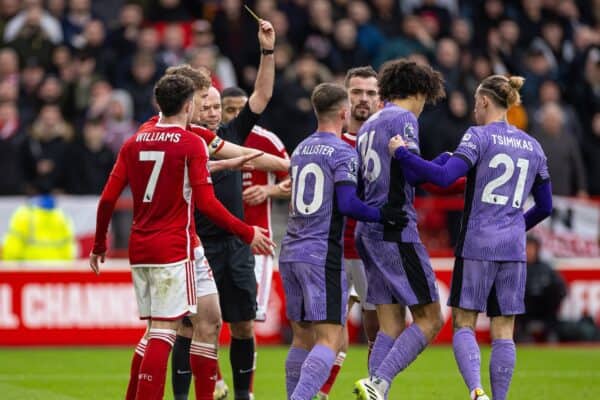
The rage from Forest fans is maybe understandable. Losing any game with virtually the last kick of the ball is a sickener, and who hasn’t raged against perceived refereeing injustice only to wake up the next day and wonder if maybe it was really a case of six of one and half a dozen of the other?
Certainly, Paul Tierney got many things wrong in that game, and those decisions went both for and against Forest.
However, the sight of a young kid having to be rescued from the stands by a Liverpool player as an angry group of supporters vented their spleens at the officials, Liverpool Football Club, its fans and anyone else who got in the way was as depressing as the moronic poverty chanting they had engaged in throughout the game.
There’s a historical symmetry in the fact that we should be discussing Forest fans in this respect actually.
This year marks the 40th anniversary of the miners’ strike in the UK, an often bloody battle between the country’s coal mining communities, the police and the state. It’s dark legacy hangs over those mining towns to this day. In these places, wounds span generations and refuse to heal.
I remember the Kop chanting “scab, scab, scab” at Forest fans in the ’80s. Nottingham, of course, was the home of the Union of Democratic Mineworkers who are to this day blamed by many in the Trade Union movement for helping to break the strike. A ‘scab’ is someone who crosses a picket line.
Liverpool back then was embroiled in its own fight for survival against the Thatcher government. For most of us, the miners’ strike represented another front in that battle and we knew whose side we were on.
Sadly though, I’m also old enough to remember Liverpool supporters chanting about Munich, loudly and in our thousands. And, while thankfully those disgusting songs are absent from today’s Kop, you may still hear the odd moron regurgitating this bile on an away coach or in a pub before or after a game. This illustrates the Jekyll and Hyde that exists within all people and all groups. Football supporters are no different, why would they be?

The chants of “scab” aimed at Forest fans at Anfield in the ’80s felt like a symbol of our class consciousness and of working-class solidarity back then. Yet the Munich chants were the antithesis of that spirit, and although I honestly didn’t make that connection back then, we were guilty of the same divisive behaviour we condemned in others.
Fast forward four decades and Liverpool fans have for the most part dropped the tragedy chants. It’s jarring to recall how few who stood on the Kop in the ’80s would have batted an eyelid as thousands of their peers belted out a song revelling in the Munich air disaster, save perhaps those old enough to recall how horrific it was. But that’s how it was back then.
Back then it seemed we were flailing around at anyone we felt we had a beef with, sometimes we punched up and when we felt the mood called for it, we punched down. In the years that have passed since those adolescent days, I believe that the crowd at Anfield has grown up to a large extent.
Two football tragedies and their aftermath have taught many of us and the generations who have followed that tragedy chanting should be left behind, but it has also sharpened the political consciousness of those who travel home and away.
Hypocrisy?
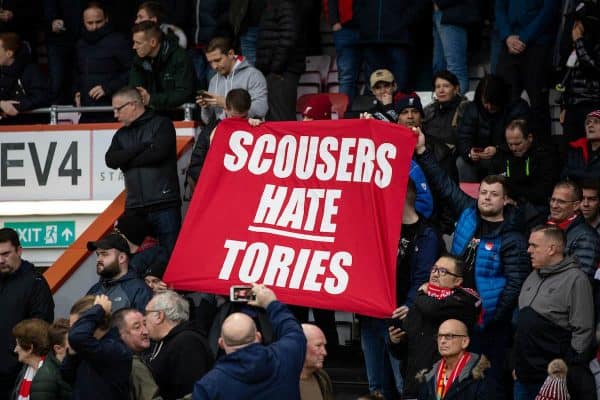
Chants of “Fuck the Tories” by Liverpool supporters are commonplace at Anfield and at away grounds around the country these days, and of course, the national anthem is roundly booed at cup finals.
In addition, Reds have been heard chanting “Maggie’s in the mud” at games. This of course is a reference to the fact that former Tory Prime Minister, and architect of the all-out assault on working class communities like Liverpool forty years ago, is now dead.
Her role in the “managed decline” of the city and the cover-up of the Hillsborough disaster has never been forgotten on Merseyside. Her legacy in the city of Liverpool means she is almost universally despised and her party has never recovered electorally as a result. It will perhaps surprise many that prior to her term in office, the Tories frequently had councillors elected to Liverpool City Council, today they have none and that is unlikely to change for the foreseeable future.
Many in “polite society” would argue that taking pleasure in the death of another – even Thatcher – is beyond the pale. Perhaps so. I admit that, as a grown-up who has now lived long enough to experience the pain of grief and loss, I’d rather we didn’t scrape that particular barrel even if I can understand why some do.
Oh to live in a world where football is a glorious escape from the madness of real life.
It is naive in the extreme to expect any group of people who have suffered at the hands of a political leader and their party, as the city of Liverpool have at the hands of Thatcher and subsequent Tory governments, to follow the rules of ‘polite society’.
The damage done to Liverpool and other communities – like those embroiled in the miners’ strike – by the policies of Thatcher and successive Tory governments are generational. The lessons of those years have been passed down in families and will never be forgotten.
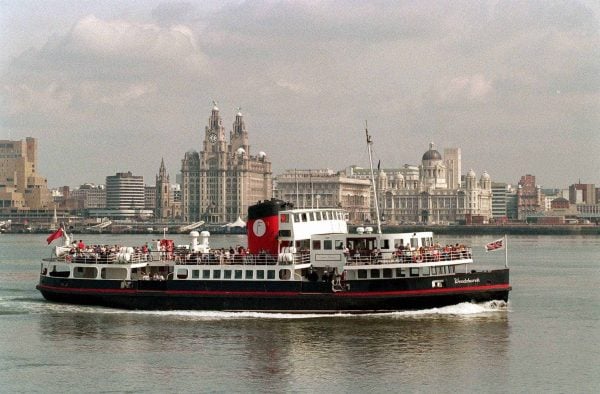
Others have cited what I believe to be a false equivalency of Liverpool supporters booing the national anthem, and singing about Thatcher’s death, and the poverty and Hillsborough chants sung by rival fans on terraces around the country. One supporter, posting on X, had this to say after some Reds had criticised Forest fans for poverty chanting two minutes into the game:
“This will probably get me pelters but I’m going to post it anyway.
“I’ve seen numerous messages from Liverpool fans suggesting that Forest fans were singing the ‘Sign On’ song to them at yesterday’s match, I’m not going to dispute that as I wasn’t there and I’ve heard it sung myself, certainly not saying it’s right but they are up in arms about it.
“One week earlier these same fans decided to boo our National Anthem at Wembley as well as break into a chorus of ‘Lizzie’s in a box’.
“My answer, your hypocrisy is off scale, don’t start moaning about other fans who goad you when your own standards are in the gutter.”
Another supporter lashed out at Scousers complaining about mass unemployment becoming the subject of terrace banter by claiming he had been made redundant five times, and he never whinged or moaned. Maybe you should have, mate. Maybe you should have fought and campaigned against those responsible. You would have had every right to.
Direct your anger at the right people
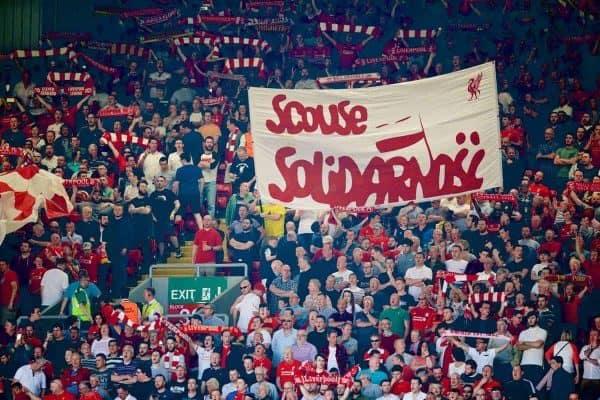
Are Liverpool supporters really guilty of hypocrisy though? My observation is that while Liverpool fans rail against the establishment, its heroes and its symbols, such as Thatcher and the national anthem, others choose to mock ordinary people who suffer as a result of the policies of that same establishment.
While Liverpool supporters are punching up, they are punching down.
This whole discussion is symptomatic of wider issues in society, of course, it is.
Football has never existed in a vacuum and societal problems will always play out on terraces inhabited by tens of thousands of ordinary people every week. They don’t leave their experiences, biases or beliefs at the turnstiles.
Oh to live in a world where football is a glorious escape from the madness of real life.
The reason I object to poverty and tragedy chanting is less about it being ‘offensive’ to me – that seems such a passive and weak word in my view – and more to do with a feeling that these chants are self-defeating.
The same people who complain that Liverpool supporters bring politics into the game and disrespect their country, its leaders, flag and anthem, are bringing politics into the game by resorting to bigoted stereotypes and mocking the same social inequality many of them experience for themselves daily.
Those chants don’t ‘offend’ me as much as they depress me. They speak to a section of society that has either never been prepared to call out the mess we are surrounded by daily, or who have given up on the idea that things can be any different. For these people, the highlight of their weeks is a desperate race to the bottom in which poverty and tragedy are fair game for terrace banter, and nothing ever changes.
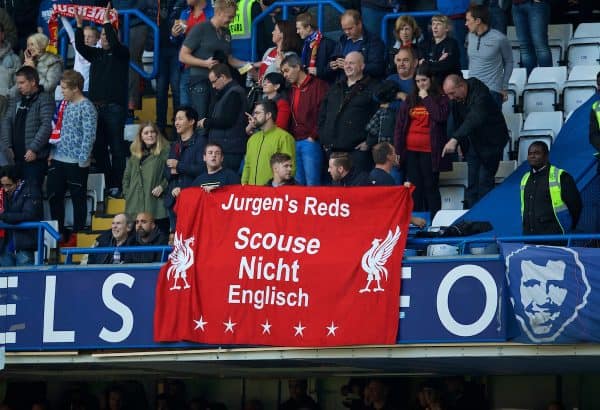
For the sake of balance, I could aim this criticism at some of our own supporters. I would also agree that there are many supporters of other clubs around the country who feel the same way I do about politics, football, and life. They disown those in their own ranks who sing about poverty or tragedy at football matches.
The majority of football supporters of all clubs can identify with their rivals. Why wouldn’t they? We all lead similar lives, have the same problems and love our teams. Most of us understand the importance of our clubs to our respective communities too.
Forty years ago, Thatcher and the Tories sought to undermine our communities and our game by sewing division wherever they could. The miners, minorities, football fans and cities like Liverpool were seen as the ‘enemy within’. Many fell for it then, and it seems there’s no shortage of people willing to take the bait today.
So, while I’m not asking for us all to sit in a circle with our tambourines, singing “Kumbaya,” it would be good if some could at least recognise that if their lives are in ruins, they should be angry with the politicians whose decisions ruined them, not supporters of another football club.
And, if your club is in ruins, then it’s probably the people currently running the game that should bear the brunt of your ire, not Scousers and not people struggling to survive a cost of living crisis.
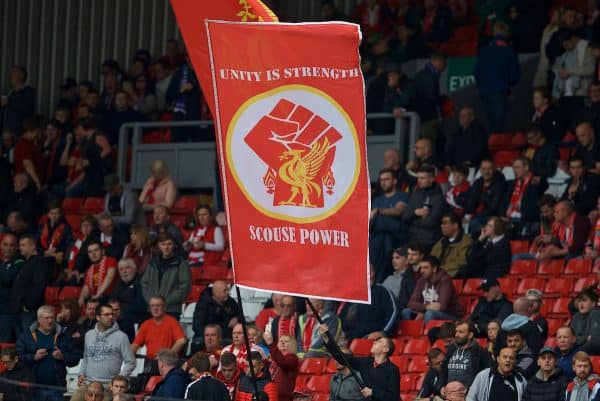




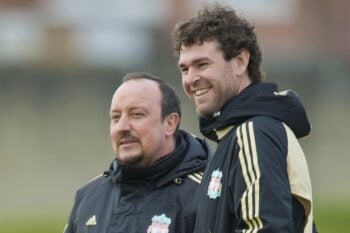


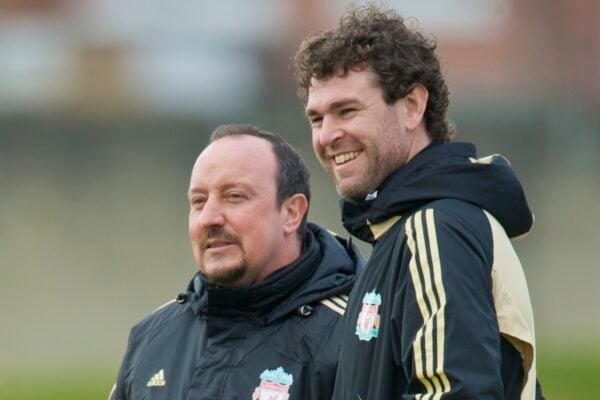




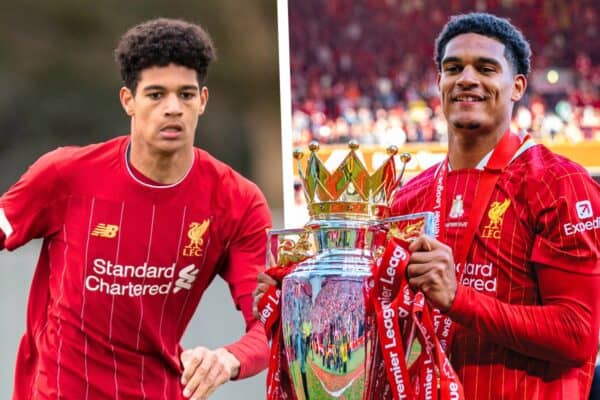




Fan Comments